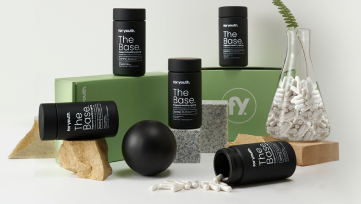Collagen Craze: Why Everyone is Raving About This Protein

Collagen, a protein powerhouse, is a key player in keeping our skin, bones, and connective tissues looking and feeling youthful.
So, what are the benefits of collagen for your skin, you ask? For starters, it can help to reduce the appearance of wrinkles and fine lines. Say goodbye to those crow’s feet and hello to a more youthful-looking you!
By signing up, you consent to receive For Youth emails
Get The Latest On Longevity Delivered To Your Inbox.
What exactly is collagen?
Collagen is a protein that makes up a significant portion of our skin, bones, and connective tissues. As we age, our bodies naturally produce less collagen, which can result in wrinkles, sagging skin, and joint pain. Fortunately, taking collagen supplements may help to alleviate these symptoms and provide numerous other health benefits.
But that’s not all! Collagen can also increase hydration, making your skin look and feel more plump and dewy. Plus, it helps to improve skin elasticity, giving you a firmer, more toned appearance. No more saggy skin for you, my friend!
Collagen isn’t just good for your skin, though. It’s also great for your overall health. By supporting joint health, collagen can help to reduce inflammation and ease joint pain. And by promoting gut health, it can improve digestion and reduce bloating. Plus, it supports bone health, which means you’ll be less likely to break a hip on the dance floor when you’re 90.
Presenting to you For Youth’s Marine Collagen Peptides.

The Skin – Marine Collagen Peptides
Marine Collagen Peptides is a science-backed anti-ageing supplement, made from fish scale. This Type I Collagen offers superior absorption by the human body.
- improves skin condition by visually reducing wrinkles, improving elasticity and hydration
- promotes muscle recovery
- supports bone and joint health
So, if you’re feeling a little less than spry these days, give our marne collagen peptides a try! Whether you opt for supplements or collagen-rich foods like bone broth, your skin and body will thank you. Just be prepared for all the compliments you’ll receive on your newfound youthful glow. Who knows, you may even get carded at the liquor store!
FAQ:
What is collagen and where does it come from?
Collagen is the most abundant protein in our bodies, making up about one-third of our total protein composition. It’s a vital building block of our skin, hair, nails, bones, and joints. Collagen comes from various sources, including bovine (cow), porcine (pig), marine (fish), and chicken. It’s also available in a synthetic form for those following a vegetarian or vegan lifestyle.
Why has collagen gained so much popularity recently?
Collagen has become a staple in the wellness and beauty industries due to its potential benefits, which include improving skin elasticity, reducing wrinkles, strengthening nails and hair, and supporting joint health. Social media, influencers, and scientific studies have all played a part in its rising popularity. Plus, the development of more palatable collagen supplements, like flavored powders and gummies, has made it more accessible and enticing to a broader audience.
How can you incorporate collagen into your diet?
Collagen can be integrated into the diet in several ways. One common method is through supplements, such as powders that can be mixed into smoothies, coffee, or soups. There are also collagen capsules and gummies for those who prefer not to taste it. Beyond supplements, bone broth is a natural source of collagen and can be consumed directly or used as a base for soups and stews. Certain foods, like chicken skin, pork skin, fish, and berries, are known to support the body’s collagen production.
Are there any notable benefits of taking collagen supplements?
Users of collagen supplements often report improvements in skin hydration and elasticity, which can lead to a reduction in wrinkles and dryness. Other cited benefits include stronger nails, thicker hair, and enhanced joint, bone, and muscle health. However, it’s important to note that individual results can vary, and some benefits are more supported by anecdotal evidence than robust scientific research.
Can everyone take collagen supplements?
While collagen supplements are generally safe for a wide audience, some individuals should approach with caution or consult their healthcare provider beforehand. This includes those with allergies to any collagen source (like fish, eggs, or shellfish if considering marine collagen) and those who are pregnant or breastfeeding, due to the lack of extensive research in these groups. Additionally, as with any supplement, collagen can interact with other medications, so it’s a good idea to discuss with a healthcare professional if you have any concerns.
What should you look for when choosing a collagen supplement?
Not all collagen supplements are created equal. When selecting a collagen supplement, consider the source of collagen (bovine, marine, etc.) and opt for one that aligns with your dietary restrictions or preferences. Look for products that have been third-party tested for purity and quality. Additionally, pay attention to the type of collagen—some products specify the collagen type (I, II, III, etc.), which may be relevant depending on your targeted health benefits (e.g., type II for joint health).
How long does it take to see benefits from taking collagen supplements?
The timeframe for noticing benefits from collagen supplements can vary greatly among individuals. Some may observe changes in skin elasticity or joint comfort within a few weeks, while for others, it might take two to three months or longer. Consistency is key when it comes to collagen supplementation, as the body needs time to absorb and utilize the protein.
Is there any scientific evidence supporting the benefits of collagen?
There is a growing body of scientific evidence supporting the various benefits of collagen supplementation, especially in areas related to skin health, bone density, and joint pain reduction. However, research is ongoing and more rigorous, long-term studies are needed to fully understand the extent of collagen’s effects. It’s also important to remember that collagen supplements work differently for everyone, and not all claims are backed by strong scientific evidence.








